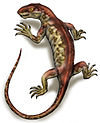| Elephantosaurus Temporal range:
Ladinian
~ | |
|---|---|
|
Scientific classification
| |
| Domain: | Eukaryota |
| Kingdom: | Animalia |
| Phylum: | Chordata |
| Clade: | Synapsida |
| Clade: | Therapsida |
| Suborder: | † Anomodontia |
| Clade: | † Dicynodontia |
| Clade: | † Kannemeyeriiformes |
| Genus: | †
Elephantosaurus Vjuschkov, 1969 |
| Type species | |
| Elephantosaurus jachimovitschi Vjuschkov, 1969
| |
Elephantosaurus is an extinct genus of dicynodont from the Middle Triassic ( Ladinian) Bukobay Formation. The holotype and only known specimen, catalogued as PIN 525/25, is a fragment of the skull that includes portions of the left interorbital region and nasal bones, and suggests a very large animal with a skull at least 30 centimetres (12 in) wide [1] (although it may have been smaller than Stahleckeria). The bones of the skull roof are also unusually thick. While usually considered a member of the Stahleckeriidae, generally due to its size, it probably falls just outside the group due to its frontal bone contributing substantially to the margin of the eye socket. [2]
- ^ V’yushkov, V.P., 1969. New dicynodonts from the Triassic of the Cis-Urals. Paleontol. Zh. 1969, 99 – 106 (in Russian).
- ^ Kammerer, C.F.; Fröbisch, J.R.; Angielczyk, K.D. (2013). "On the Validity and Phylogenetic Position of Eubrachiosaurus browni, a Kannemeyeriiform Dicynodont (Anomodontia) from Triassic North America". PLOS ONE. 8 (5): e64203. Bibcode: 2013PLoSO...864203K. doi: 10.1371/journal.pone.0064203. PMC 3669350. PMID 23741307.
| Elephantosaurus Temporal range:
Ladinian
~ | |
|---|---|
|
Scientific classification
| |
| Domain: | Eukaryota |
| Kingdom: | Animalia |
| Phylum: | Chordata |
| Clade: | Synapsida |
| Clade: | Therapsida |
| Suborder: | † Anomodontia |
| Clade: | † Dicynodontia |
| Clade: | † Kannemeyeriiformes |
| Genus: | †
Elephantosaurus Vjuschkov, 1969 |
| Type species | |
| Elephantosaurus jachimovitschi Vjuschkov, 1969
| |
Elephantosaurus is an extinct genus of dicynodont from the Middle Triassic ( Ladinian) Bukobay Formation. The holotype and only known specimen, catalogued as PIN 525/25, is a fragment of the skull that includes portions of the left interorbital region and nasal bones, and suggests a very large animal with a skull at least 30 centimetres (12 in) wide [1] (although it may have been smaller than Stahleckeria). The bones of the skull roof are also unusually thick. While usually considered a member of the Stahleckeriidae, generally due to its size, it probably falls just outside the group due to its frontal bone contributing substantially to the margin of the eye socket. [2]
- ^ V’yushkov, V.P., 1969. New dicynodonts from the Triassic of the Cis-Urals. Paleontol. Zh. 1969, 99 – 106 (in Russian).
- ^ Kammerer, C.F.; Fröbisch, J.R.; Angielczyk, K.D. (2013). "On the Validity and Phylogenetic Position of Eubrachiosaurus browni, a Kannemeyeriiform Dicynodont (Anomodontia) from Triassic North America". PLOS ONE. 8 (5): e64203. Bibcode: 2013PLoSO...864203K. doi: 10.1371/journal.pone.0064203. PMC 3669350. PMID 23741307.





